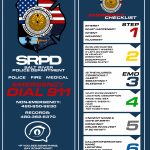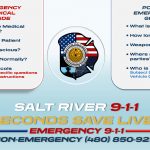Public Safety Communications Division
Dispatching
Police – Fire – Emergency Medical Services
Mission
The Mission Statement for the Public Safety Communications Division is to provide a professional level of emergency 9-1-1 call taking, dispatching and record keeping service to the Community, police, and fire department through integrity, trust, and accountability.
General Information
The Salt River Pima-Maricopa Indian Community Communications Division is the Public Safety Answering Point for the E9-1-1. The Division operates 24 hours-a-day, 7 days-a-week and dispatchs police services, fire services and emergency medical service for the Community. The Division consists of a staff of 21. The Division averages approximately 65,000 calls for service per year with 10% of the calls for fire and emergency medical service. On average, the center handles approximately 130,000 phone calls including E9-1-1 and wireless 9-1-1 calls. Ninety-six percent of 9-1-1 calls received are answered in the first 3 seconds, which is rated as excellent by industry standards.
When to call 911
Only call 911 for the following reasons:
- To stop a crime
- To report a fire
- To save a life
For all other concerns, call our non-emergency line at 480-850-9230.
What’s the non-emergency line?
Call this number to report the following:
- Any crime to a person not life-threatening
- Burglary to a home not in progress
- Auto theft not in progress
- Parking complaints
- Loud music complaints
When to contact 911 for CV19
Call 911 if you are:
- Having difficulty breathing or are choking
- Having an allergic reaction
- Having symptoms of a heart attack or stroke
- Are experiencing feelings of confusion, dizziness, or are disoriented
- Having difficulty speaking, walking, or seeing
- Have sudden severe pain
Do NOT call 911 if you :
- Want information about COVID-19
- Need a ride to the doctor’s office
- Want to get tested
- Have mild symptoms
Staff
- 1 Communications Manager
- 4 Communications Shift Supervisors
- 3 Dispatcher II Positions
- 17 Public Safety Communications Dispatchers
Equipment and Technology
The Division utilizes all of the following to better serve the Community:
- 5-position Communications Console
- Computer Aided Dispatch
- Computerized Records Management
- Mobile Data Communications
- Multi-channel Radio Console with Fire Paging
- Positron Power 9-1-1 and Mapping
- Multi-channel Audio Logger
- 35-seat Training Room with Smartboard
- TERC (Tribal Emergency Response Center)
- 3 Redundant Generators for Emergency Power
- 200-foot Radio Tower
- ACIC/NCIC
- Participant, AMBER Alert in Indian Country Program
IF YOU HAVE AN EMERGENCY, CALL 9-1-1
The Salt River Police Department utilizes “Enhanced 9-1-1”. This means that when you call 9-1-1 from any location, land line or cell phone, on the Salt River Pima-Maricopa Indian Community, a Salt River Police Department Communications Officer will answer your call. The Communications Division personnel (dispatchers) are trained to determine what aid is necessary and send it to you.
Everyone is taught to call 9-1-1 for help, here is some information so that you can help 9-1-1:
- Know your address or the address/location that you are at when you need help.
- What is an emergency? When you feel someone’s life or property is in danger. When you need a police officer, paramedics, or the fire department, dial 9-1-1. If you are not sure if you need to dial 9-1-1, do not hesitate. Through questioning, the dispatcher can determine if you have an emergency and will prioritize and respond with the appropriate emergency service. If the dispatcher gives you the non-emergency number to call, please do so, in order to keep the 9-1-1 lines open for other emergencies.
- Stay on the telephone with the dispatcher when you are asked to do so, the more information the dispatcher can give to police officers and firefighters, the more it will help them to be ready to give you the help you need. Hanging up will not get help to you any quicker. Answer all questions the dispatcher may ask as responses are based on the information callers provide. Calls are being dispatched as the questions are being asked and staying on the phone will not delay the dispatching of a call for service. Always let the dispatcher end the call.
- You can play a big part in getting help to you, your family, and our Community by learning these simple hints, and teaching them to your children.
- Using 9-1-1 appropriately will get you the help you need quicker, and make our Community safer. Call 9-1-1 for emergencies only. If you need information or have a question, please call the non-emergency number, which is 480-850-9230.
- You, the citizens, employees and visitors of the Community are the most important part of the Emergency Response System. Help us to serve you in the spirit we want to, with ‘SERVICE, RESPECT, PROFESSIONALISM AND DEDICATION’.
.
What to expect when calling 911
What questions will the 911 operator ask?
- What is your current location?
- What is your phone number?
- What is happening?
- When did the incident occur?
- Are there injuries?
- Can you describe any suspicious persons or vehicles?
- Do you want contact from officers?
How long will it take for Officers to respond?
Officers always try to respond as quickly as possible; however, there are a number or factors that determine how long you may wait for an officer to respond. For instance, the number of incidents and priority of calls could delay the officer from responding to your incident immediately. The type, and priority of calls determine the response time as will the number of available officers in your neighborhood.
Can I request an estimated time of arrival?
While it is reasonable to want to know how long it will take for an officer to respond, there are several logistical and operational barriers that make it difficult for call-takers to provide citizens with an estimated time of arrival (ETA).
Due to the dynamic of constantly changing call volume, officer availability cannot be precisely estimated. Some calls may be resolved in just a few moments, while others require more thorough investigation and could take hours to complete.
How are calls processed?
When you call for assistance, whether you are reporting an emergency or a non-emergency situation, your incident is entered into our Computer Aided Dispatch System (CAD) for tracking purposes. We verify your address, obtain your contact numbers, create a short summary of what is happening, determine the nature of incident, and assign a priority ranking to the call. These priority rankings are established by the Salt River Police Department.
How are 911 calls prioritized?
Call volume in the 911 Communications Center fluctuates through the day. At any time, we can receive numerous high–priority calls, or perhaps a single call requiring multiple-officer response. Emergency calls always take priority and are dispatched first. Priority rankings are established by the Denver Police Department.
Why were Officers diverted when responding to my call?
Officers are sometimes diverted from lower-priority calls to respond to higher-priority emergencies. This process ensures safety for our citizens and Denver’s first responders, but may increase the response time for lower-priority calls.
Salt River Police Officers are also diverted to assist in handling medical emergencies and the Salt River Fire Department at large scale fire emergencies.
What happens if I accidentally dial 911?
If you mistakenly reach 911, please do not hang up before the 911 Operator answers the phone. The information from your phone still enters our system. If you aren’t on the phone when the Operator answers, she or he will call you back. The time spent calling people back who have inadvertently dialed 911 takes time away from people who need emergency help.


